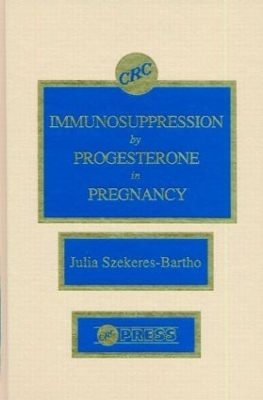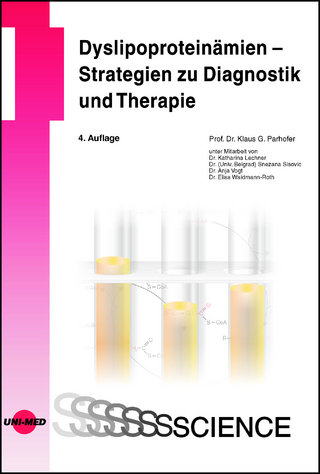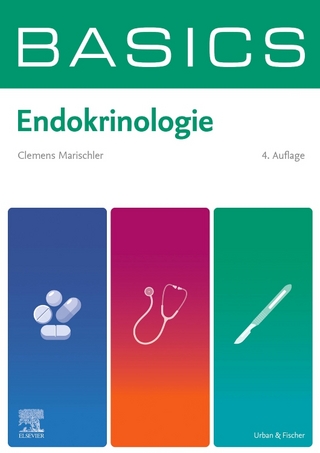
Immunosuppression by Progesterone in Pregnancy
Crc Press Inc (Verlag)
978-0-8493-5396-3 (ISBN)
- Titel ist leider vergriffen;
keine Neuauflage - Artikel merken
INTRODUCTION AND GENERAL OVERVIEW. Why is the Immunologically Incompatible Fetus not Rejected by the Mother? Possible Protective Mechanisms Preventing "Rejection". THE ROLE OF HORMONES IN THE REPRODUCTIVE PROCESS. IMMUNOMODULATORY EFFECTS OF REPRODUCTIVE HORMONES. Glycoprotein Hormones. Steroid Hormones.THE EFFECT OF PROGESTERONE ON THE IMMUNE RESPONSE. The Effect of Progesterone on Suppressor Cells. The Effect of Progesterone on the Effector Phase. LYMPHOCYTE RESPONSIVENESS IN NORMAL AND PATHOLOGICAL PREGNANCY. FACTORS INVOLVED IN LOCAL IMMUNOREGULATION. NATURAL KILLER AND NK-LIKE ACTIVITY IN NORMAL AND PATHOLOGICAL PREGNANCY. THE MECHANISM OF HIGHER THAN NORMAL NATURAL CYTOTOXIC ACTIVITY IN WOMEN AT RISK FOR PREMATURE PREGNANCY TERMINATION. DECREASED NK OR NC ACTIVITY IN PREGNANCY IS DUE TO A SERUM COMPONENT. PROGESTERONE AS AN IMMUNOLOGIC BLOCKING FACTOR IN PREGNANCY SERUM. PREGNANCY LYMPHOCYTES POSSESS A UNIQUE PROGESTERONE SENSITIVITY. THE IMMUNOSUPPRESSIVE EFFECT OF SERUM PROGESTERONE IS LIMITED BY THE PROGESTERONE BINDING CAPACITY OF THE LYMPHOCYTES. PROGESTERONE RECEPTORS IN PREGNANCY LYMPHOCYTES. PROGESTERONE RECEPTORS IN LYMPHOCYTES OF HEALTHY PREGNANT WOMEN AND NONPREGNANT INDIVIDUALS. LYMPHOCYTE PROGESTERONE RECEPTORS IN NORMAL AND PATHOLOGICAL PREGNANCIES. IS THERE A CAUSE-EFFECT RELATIONSHIP BETWEEN THE LACK OF LYMPHOCYTE PROGESTERONE RECEPTORS, AND PREGNANCY TERMINATION? Alteration of Lymphocyte Function in Women Treated With Antiprogesterone. REGULATION OF LYMPHOCYTE PROGESTERONE RECEPTORS. PROGESTERONE RECEPTORS ARE INDUCIBLE IN LYMPHOCYTES OF NONPREGNANT DONORS. IN VIVO ALLOGENEIC STIMULATION RESULTS IN LYMPHOCYTE PROGESTERONE RECEPTOR EXPRESSION. MAJOR HISTOCOMPATIBILITY COMPLEX (MHC) PRODUCTS REGULATE LYMPHOCYTE PROGESTERONE RECEPTOR EXPRESSION IN VITRO. THE ROLE OF PLACENTAL CELLS IN THE REGULATION OF LYMPHOCYTE PROGESTERONE RECEPTOR EXPRESSION DURING PREGNANCY. Lymphocyte Progesterone Receptor Induction by Placental Cells from First Trimester and Term Placentae. Regulation of PHA-Induced Lymphocyte Progesterone Receptor Expression by Placental Cells from First Trimester and Term Placentae. GESTATIONAL AGE-RELATED CHANGES OF MEMBRANE FLUIDITY INFLUENCE ANTIGEN PRESENTATION BY TROPHOBLAST CELLS. Membrane Lipid Microviscosity and P Content of Villous Surface Membranes from Spontaneous and Induced Abortions. Modulation of Membrane Fluidity Alters Antigenicity of Trophoblast Cells. Membrane Fluidity of Trophoblast Cells and Susceptibility to Lysis. Modulation of Membrane Fluidity Influences the Progesterone Receptor Inducing Capacity of Trophoblast Cells. THE MECHANISM OF PROGESTERONE-MEDIATED IMMUNOSUPPRESSION IN PREGNANCY. THE MODE OF ACTION OF PROGESTERONE IN PREGNANCY LYMPHOCYTES. CHARACTERIZATION OF A PROGESTERONE-INDUCED BLOCKING FACTOR. RELATIONSHIP BETWEEN ARACHIDONIC ACID METABOLISM AND THE CYTOTOXIC ACTIVITY OF THE LYMPHOCYTES. Exogeneous Arachidonic Acid Overcomes the Inhibitory Effect of PIBF on Natural Cytotoxicity. The Effect of Cyclooxygenase and Lipoxygenase Inhibitor on Cytotoxicity. The Effect of Lipopolysaccharide on Cytotoxicity. THE ROLE OF PROSTAGLANDINS IN IMMUNOREGULATION DURING PREGNANCY. Inhibition of Prostaglandin Synthesis In Vivo. Effects of In Vitro and In Vivo Treatments With PGF2a. Alteration of Progesterone and Prostaglandin Sensitivity of the Lymphocytes at the Termination of Pregnancy Results in Increased Cytotoxicity. The Blocking Effect of PGE2 on Lymphocyte Reactivity is Influenced by High Concentrations of Human Serum. THE ORIGIN AND THE IMMUNOMODULATORY EFFECTS OF THE PROGESTERONE-INDUCED BLOCKING FACTOR. The Blocking Factor is Produced by CD8+ T Cells Via the Receptor-Mediated Action of Progesterone. Progesterone Suppression of Pregnancy Lymphocytes is not Mediated by a Glucocorticoid Effect. Immunological Effects of the PIBF. ELISA TEST FOR THE DETECTION OF THE PROGESTERONE-INDUCED BLOCKING FACTOR IN HUMAN PREGNANCY SERUM. Relationship Between Immunological and Biological Blocking Activity of the Sera. Assessment of PIBF Values During Normal Pregnancy. PIBF Values at the Termination of Pregnancy. PIBF in 16th-Week Sera of Spontaneously Aborting Women. PIBF in the Sera of Women With Regular Uterine Contractions. THE BIOLOGICAL AND CLINICAL SIGNIFICANCE OF LYMPHOCYTE PROGESTERONE RECEPTORS. A PROPER PRESENTATION OF FETAL ANTIGENS TO THE MATERNAL IMMUNE SYSTEM IS REQUIRED FOR THE OPERATION OF THE PROGESTERONE-DEPENDENT IMMUNOMODULATORY PATHWAY IN VIVO. THE PROGESTERONE-INDUCED BLOCKING FACTOR COUNTERACTS THE ABORTIVE EFFECT OF PROGESTERONE RECEPTOR BLOCK IN MICE. AN ANIMAL MODEL FOR EXPLAINING HIGH AND LOW RESPONSES TO ANTIPROGESTERONE TREATMENT. THE EFFECT OF THE PROGESTERONE-INDUCED IMMUNOLOGICAL BLOCKING FACTOR IN NK-MEDIATED RESORPTIONS.
| Erscheint lt. Verlag | 18.3.1992 |
|---|---|
| Verlagsort | Bosa Roca |
| Sprache | englisch |
| Maße | 156 x 234 mm |
| Gewicht | 385 g |
| Themenwelt | Medizinische Fachgebiete ► Innere Medizin ► Endokrinologie |
| Studium ► 1. Studienabschnitt (Vorklinik) ► Histologie / Embryologie | |
| Studium ► Querschnittsbereiche ► Infektiologie / Immunologie | |
| Naturwissenschaften ► Biologie ► Zoologie | |
| ISBN-10 | 0-8493-5396-3 / 0849353963 |
| ISBN-13 | 978-0-8493-5396-3 / 9780849353963 |
| Zustand | Neuware |
| Haben Sie eine Frage zum Produkt? |
aus dem Bereich


